Best keyboards for beginners 2025: Get started with our expert pick of beginner keyboards for all ages
Looking for the best piano keyboard for beginners? Well MusicRadar has you covered with expert advice and useful recommendations from industry professionals
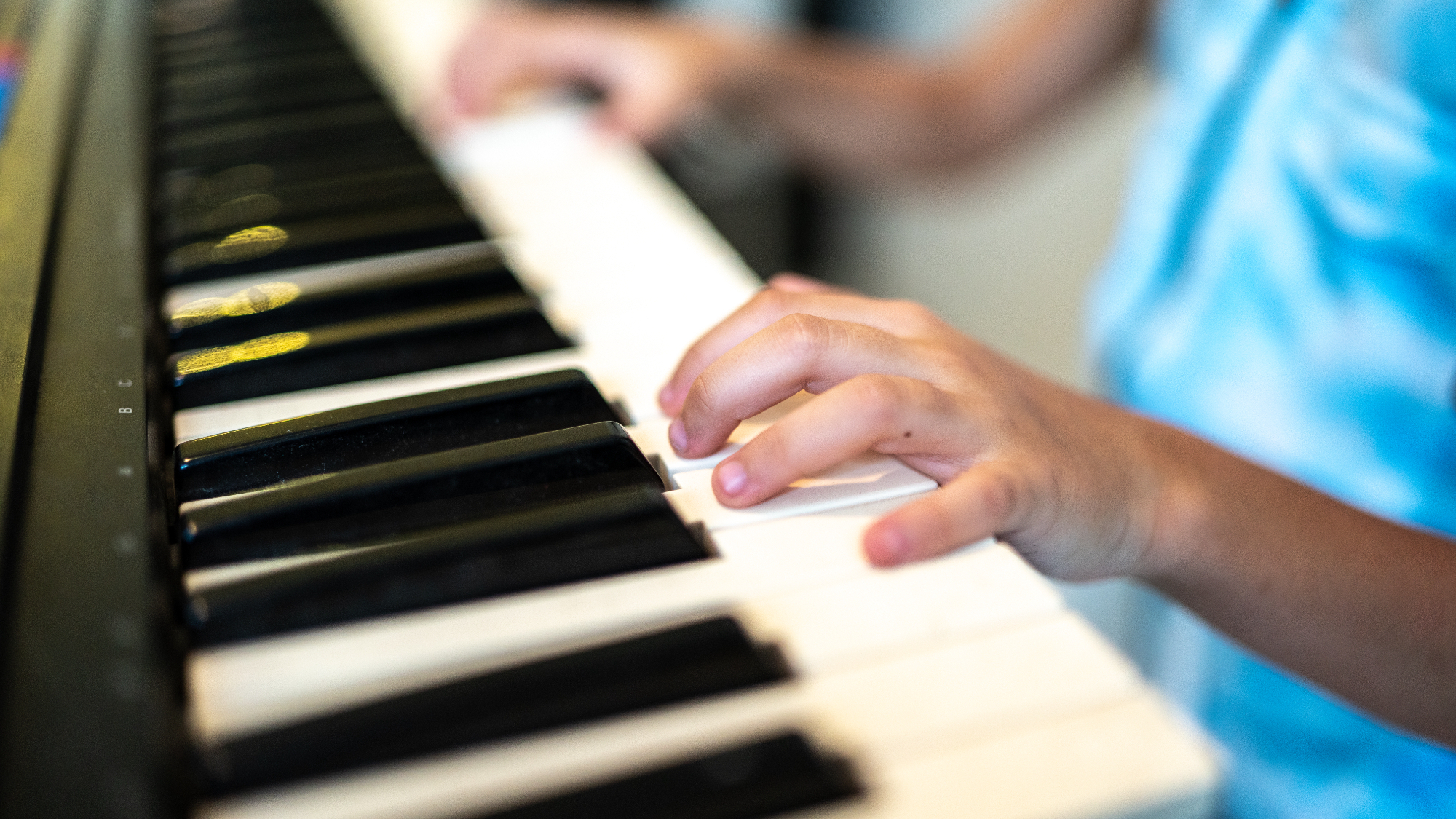
It has never been easier - or cheaper - to start playing the keyboard. Of course, to get started, you'll need one of the best keyboards for beginners. Now, with the sheer amount on offer, it can be daunting to know where to start and where to spend your budget. Luckily, I've put together this handy guide to the best beginner keyboards to help point you in the right direction.
If you or your child is considering learning the keys, you'll find a vast array of choices out there, from all-singing, all-dancing home keyboards to more basic piano-like instruments and everything in between. To avoid confusion, I've selected what I believe are the best keyboards for beginners that are sure to kickstart anyone's musical journey.
So what makes me qualified to guide you through the wonderful world of keyboards? Well, I’m a former music retail manager, and I spent much of my nearly 10 years in that part of the industry helping pair musicians with instruments. I have since shifted away from selling musical instruments and now use my years of experience writing for MusicRadar, reviewing the latest models, and hand-crafting buyer's guides for the site.
My top choice right now is the Casio Casiotone CT-S1. This entry-level keyboard offers a great selection of sounds and an accessible key action that is ideal for newbie players. For those on a tight budget, we suggest the Casio CT-S300. This clever keyboard perfectly balances features and price, offering stellar value for money.
If you just want to check out the rest of our top picks, you can head straight to the full round-up below. If you need more guidance to help you select the right beginner keyboard for your needs, head over to our comprehensive FAQ section.
Our top picks
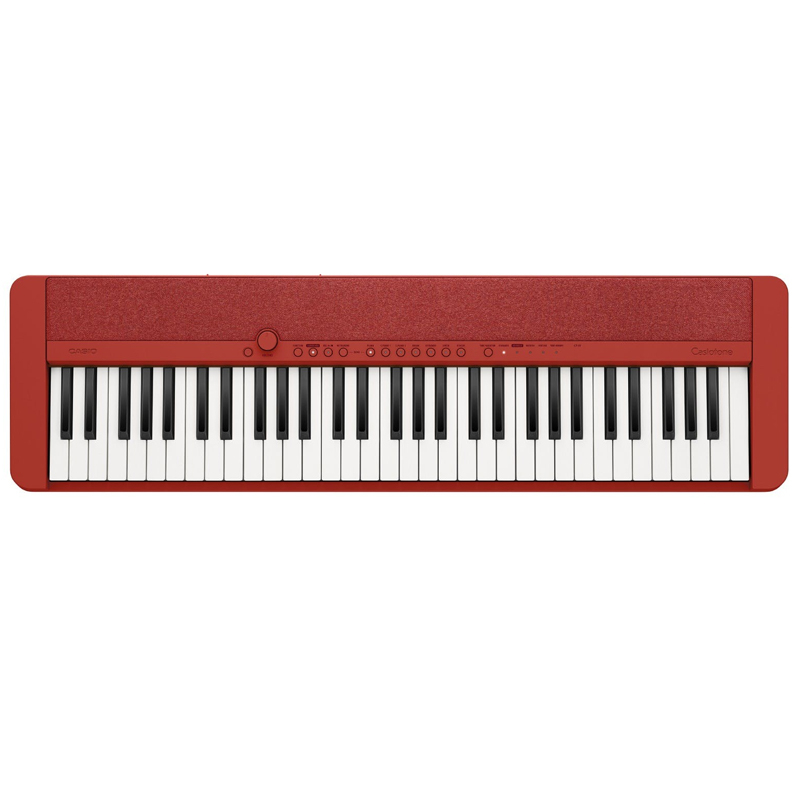
Building on the legacy of the original, the CT-S1 is fully portable with 61 built-in voices, 61 full-size, touch-sensitive keys and 64 note polyphony.
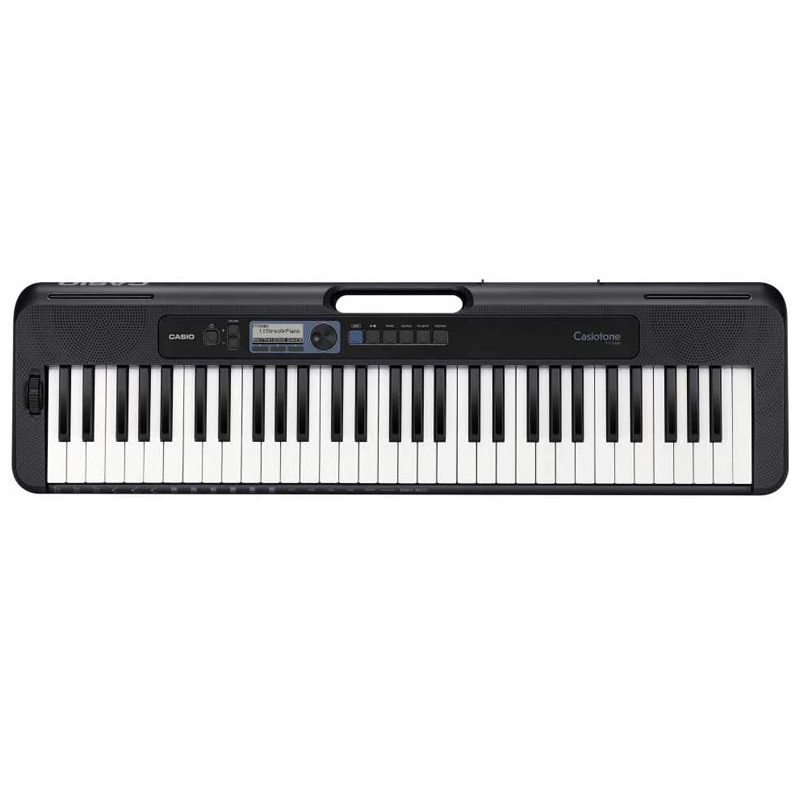
We’ve chosen the CT-S300 for the way it balances features and price. With a full-size, velocity-sensitive 61-note keyboard, this is ideal for newbie players.
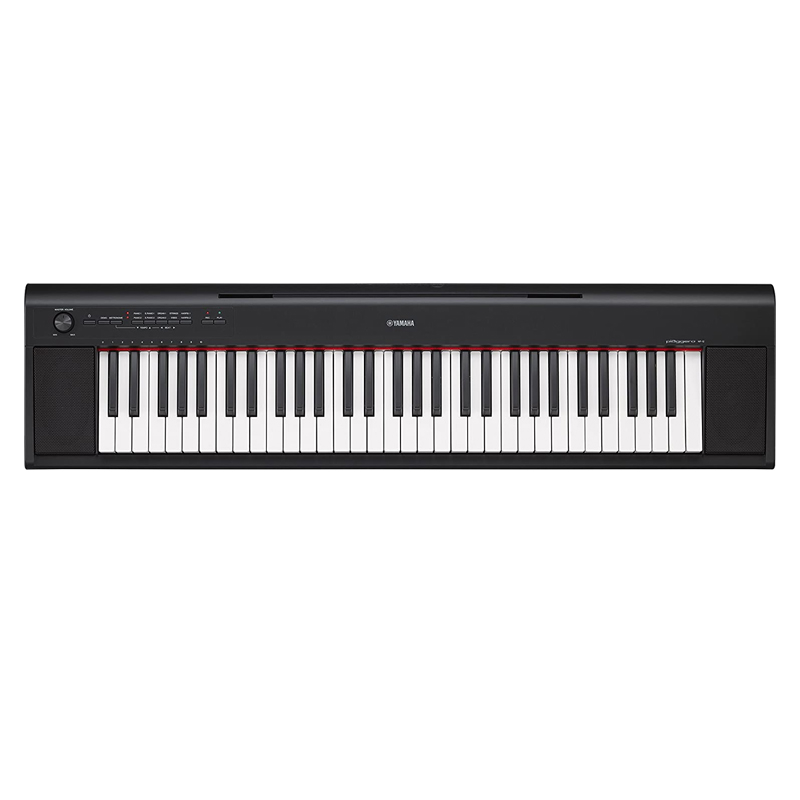
The highly portable Yamaha Piaggero NP15 has to be our top pick for adults looking to learn piano or keyboard for the first time.
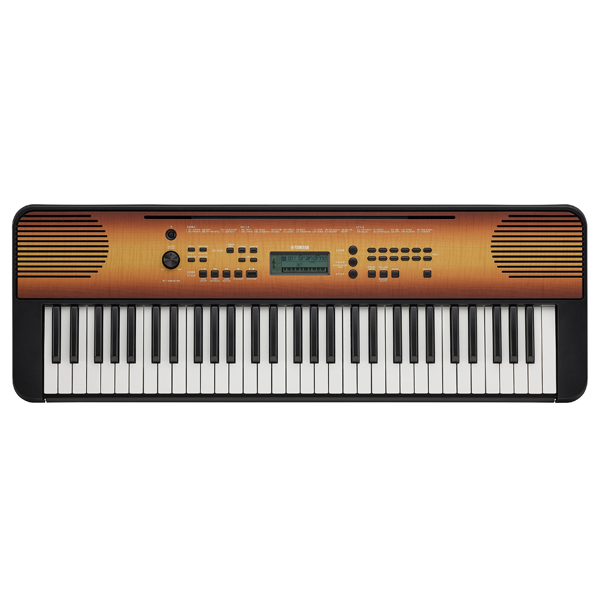
Available in two stunning wood-effect finishes, dark walnut or maple, the PSR-E360 stands out as one of Yamaha's more stylish keyboards.
Read more below
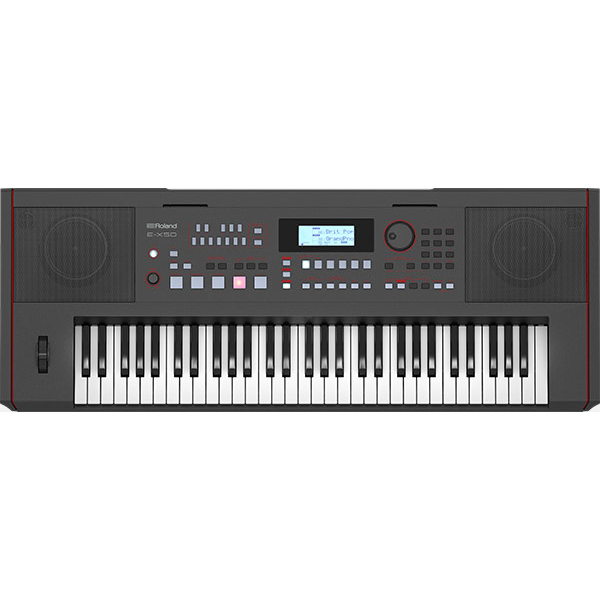
If you’ve outgrown your first beginner keyboard and are looking for something with a bit more flair, let me introduce you to the Roland E-X50.
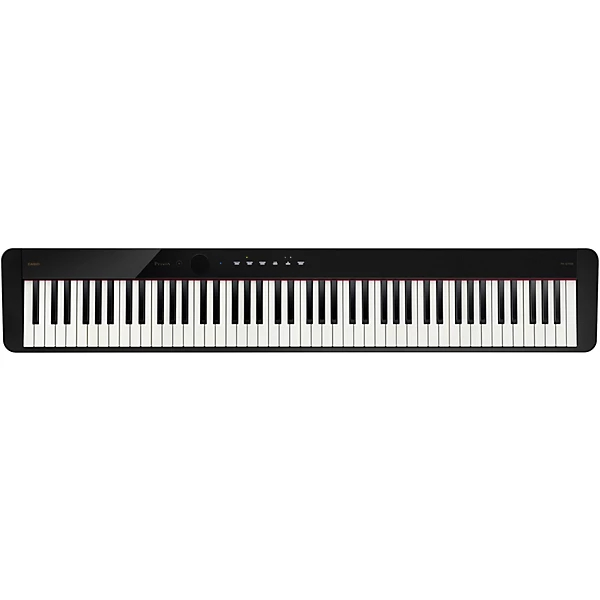
If you've got your heart set on learning the piano, then Casio's Privia PX-S1100 is the instrument for you. This model is our pick for the best beginner keyboard with weighted keys.
Best keyboard overall
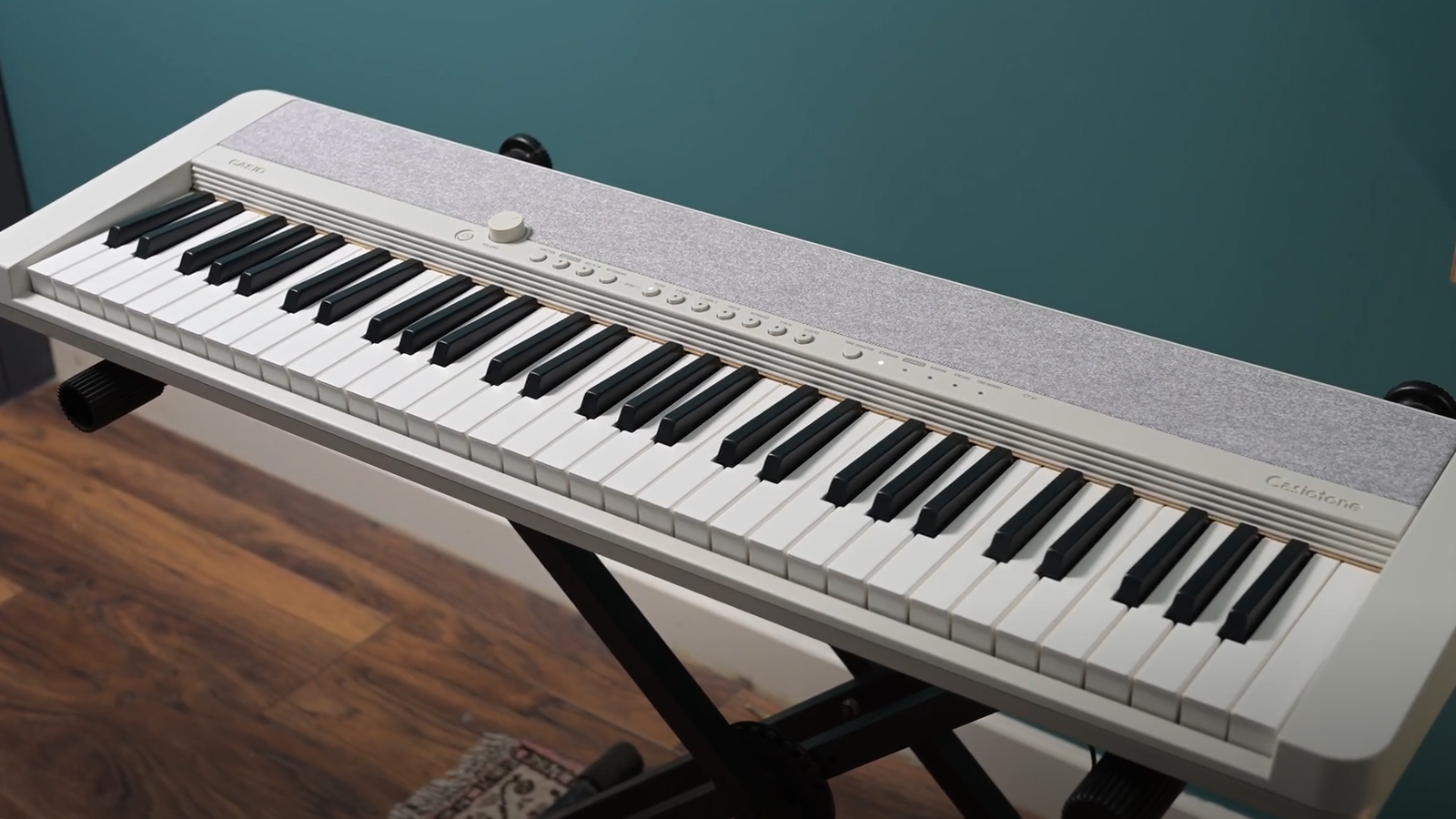
1. Casio Casiotone CT-S1
Our expert review:
Specifications
Reasons to buy
Reasons to avoid
✅ Buy if you are looking for great sounds: The AiX Sound Source produces great sounds, setting this keyboard apart from the previous entry.
❌Avoid if you need more audio outputs: Unfortunately, this keyboard doesn't come with 1/4-inch audio outputs, so it isn't great for playing concerts.
What is it? In 1980, Casio released a revolutionary beginner keyboard that, for the time, offered state-of-the-art sounds, full-sized keys, and eight-note polyphony - not to mention it was incredibly affordable. The original Casiotone was a monumental success, but it hardly holds up to today's standards. Well, luckily, Casio has brought the Casiotone into the modern day, with the release of the CT-S1.
Building on the legacy of the original Casiotone, the CT-S1 is a fully portable keyboard with 61 built-in voices, 61 full-size, touch-sensitive keys and now 64-note polyphony. We feel the simplified control layout results in a sleek, uncluttered look, while the range of colours - red, white or black - means you can find a keyboard to fit your personal style.
Build: The CT-S1 boasts a lightweight and compact design, making it easy to transport to and from lessons. It can be powered by six AA batteries or via the included mains adapter. It also has 2.5W speakers covered in fabric mesh and various connectivity options, including mini headphone/output, audio input, a micro USB port, and a full-size USB port for Bluetooth connectivity, along with a pedal jack for sustain pedals.
Performance: While the keyboard doesn’t feature weighted hammer action, its smooth, reliable keys and velocity sensitivity offer pretty good playability, in my opinion. Additional features include a MIDI song recorder, metronome, and various sound effects, making it a user-friendly yet capable instrument for both beginners and seasoned players seeking a portable option.
Sound: At the heart of the Casiotone is the AiX Sound Source. This sound engine delivers dynamic and expressive tones, perfect for beginners and professionals alike. The built-in speakers produce surprisingly good sound quality, suitable for both practice and casual music listening. The Casio Casitone is easily one of the best Casio keyboards on the market right now and easily takes our top slot.
Watch our demo video...

"For me, I think the Casiotone CT-S1 is pretty much the perfect beginner’s keyboard. The humble CT-S1 offers great sounds and playability at a very competitive price."
Read our full Casio Casiotone CT-S1 review
Best on a budget
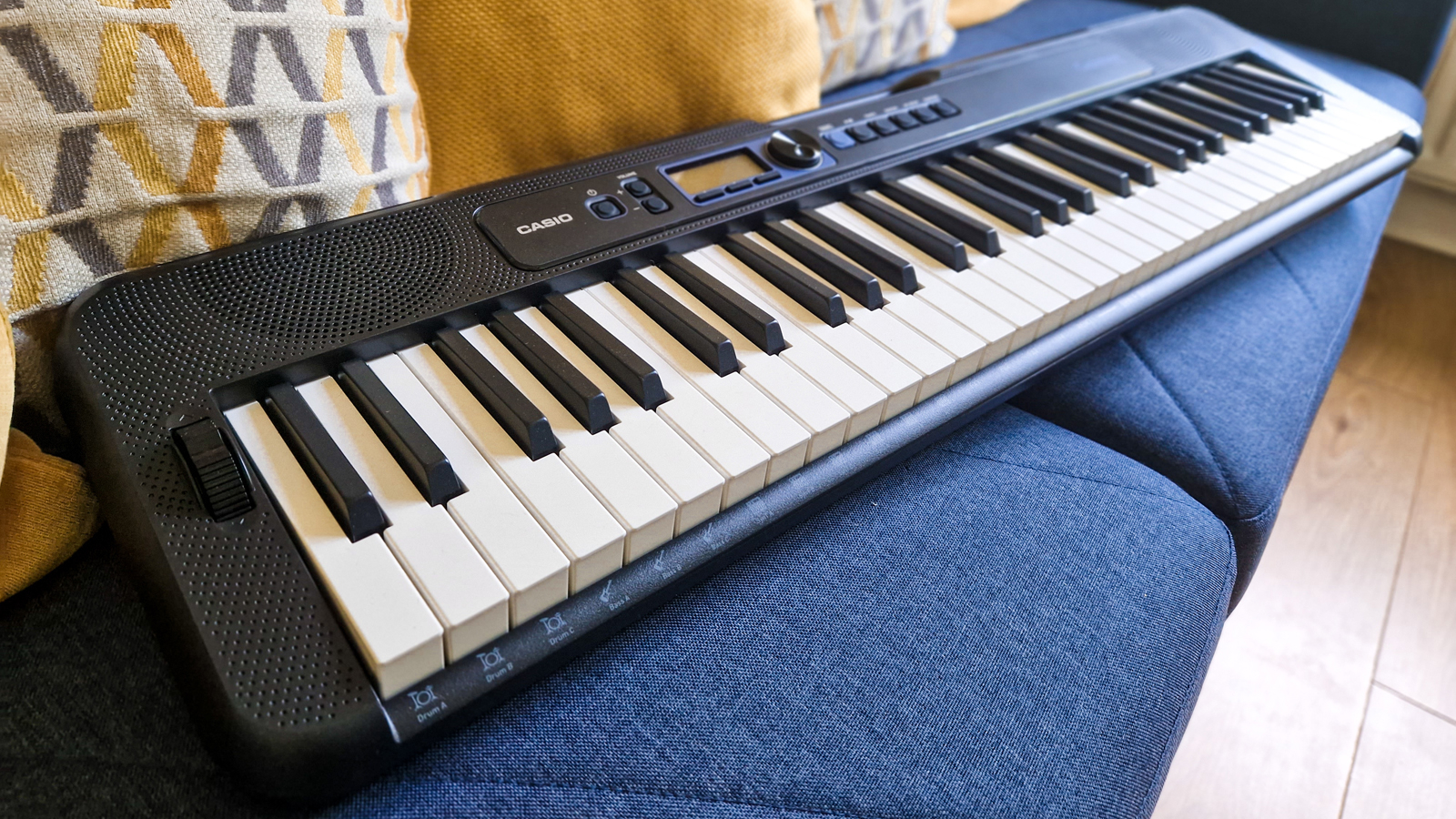
2. Casio CT-S300
Our expert review:
Specifications
Reasons to buy
Reasons to avoid
✅ Buy if you are looking for a great option on a budget: The Casio CT-S300 perfectly balances price and features, resulting in the best budget keyboard on our list.
❌Avoid if you want hyper-realistic tones: Yes, this Casio does come loaded with a plethora of tones, but not all of them are brilliant.
What is it? Casio has a solid pedigree when it comes to portable electronic keyboards for beginners, and their current lineup doesn’t disappoint. We’ve chosen the CT-S300 for the way it balances features and price.
With a full-size, velocity-sensitive 61-note keyboard, convenient built-in carrying handle and three colour options (black, white or red), plus a library of over 400 sounds, 77 rhythms, built-in reverb, dance music mode, aux input and compatibility with Casio’s Chordana teaching app, there’s more than enough here to keep newcomers busy – you even get a 60-song songbook thrown in!
Build: The Casio CT-S300 boasts a simple yet appealing design, available in red, black, and white. Its lightweight structure at just 3.3 kg makes it exceptionally portable, perfect for young players or anyone who needs to practice on the go. I really liked the built-in handle, as it makes it really easy to transport to lessons, school, or rehearsals.
Performance: Equipped with touch-responsive "piano-like" keys, the CT-S300 manages to allow me to perform decent playing dynamics despite not having weighted keys. While these keys feel different from a traditional piano, they are surprisingly pleasant to play, allowing me to express myself just like I would on my own home piano. With 400 tones and 77 rhythms, players have a wealth of options to explore, though some voices may not hit the mark. The clear LCD screen and intuitive dial make navigating through sounds seamless.
Sound: Speaking of sounds. The keyboard’s 13 cm x 6 cm oval speakers deliver an impressively clear tone, with a nice high-end brightness and mid-range richness, though I do feel the bass frequencies are limited. For me, noteworthy tones include the grand piano and electric piano voices. Additionally, the unique Dance Music Mode adds a fun twist, allowing users to create EDM tracks easily, appealing to younger players looking to break away from stuffy classical pieces.
For us, the CT-S300 proves why Casio is the king of the budget keyboard category. Offering superb build quality, an accessible key action and quirky added extras, this keyboard is a brilliant first instrument, a valuable travel companion or a useful studio tool - all for an unbeatable price.
Watch our demo video...
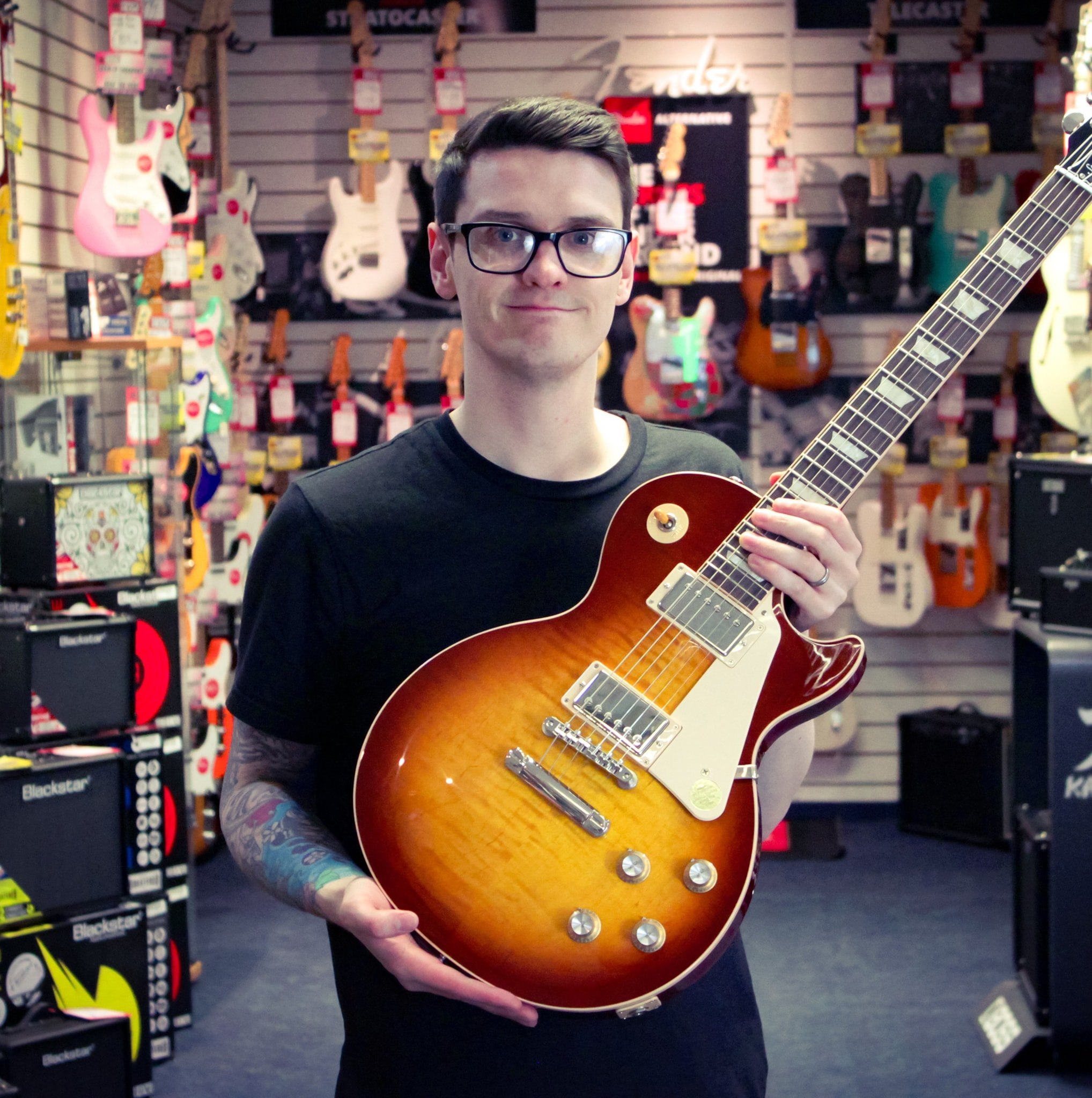
"I found the Casio CT-S300 to be a fun and practical beginner keyboard that offers players a plethora of voices and rhythms. Pair that with its lightweight, compact build and battery operation and this keyboard quickly becomes a contender for one of the best keyboards for budding players looking to kick start their playing career."
Read our full Casio CT-S300 review
Best for adults

3. Yamaha Piaggero NP-15
Our expert review:
Specifications
Reasons to buy
Reasons to avoid
✅ Buy if you are looking for reliability: In our opinion, Yamaha makes some of the best quality musical instruments in the world. Whether it's a beginner keyboard or an electric guitar, Yamaha products are always reliable.
❌Avoid if you need lots of sounds: Unfortunately, the NP-15 doesn't come with as many sounds as some of the other keyboards on this list.
What is it? Available in two sizes – the NP-15 has 61 keys while the NP-25 has 76 – the Piaggero series of Yamaha keyboards are no-frills, lightweight piano-style keyboards that sound fantastic and really look the part, especially for adult beginners. These excellent beginner keyboard pianos are compact and supremely portable and feature built-in speakers, a velocity-sensitive keyboard and sounds sampled from a Yamaha concert grand piano.
Build: As soon as I got this keyboard out of the box, I knew I was holding an instrument made with a real savoir-faire. Like all Yamaha products, it feels sturdy and well-made and pretty premium, despite its small asking price. It looks the part, too. The design is minimal, while elements such as the red felting that sits along the base of the keys, the matt black finish and the pleasing knob give the piano an understated and classy look.
Performance: We found this keyboard very easy to play, and while it’s limited to just 15 different sounds, the voices are all very high quality and just the job if your primary focus is learning piano without distractions such as one-finger chord accompaniment and animal sound effects. There’s a simple onboard recorder that can be used to record and playback your performances to evaluate your progress, and the 2.5W built-in speakers are certainly loud enough for home practice.
Sound: The NP-15 introduces five new sounds to its lineup, bringing the total to 12 high-quality voices, including three pianos and three e-pianos. For the most part, the tones are rich and deep, but sound somewhat grown-up compared to other beginner-focused keyboards.
A modern upgrade, like a felted piano or a contemporary synth, would be more appealing to younger players, but for what it's worth, I think this model is ideal for more mature learners.

"Like its predecessor, I found the NP-15 to be a fantastic entry-level piano and an excellent instrument for those who want to play on the go."
Read our full Yamaha Piaggero NP-15 review
Best for kids
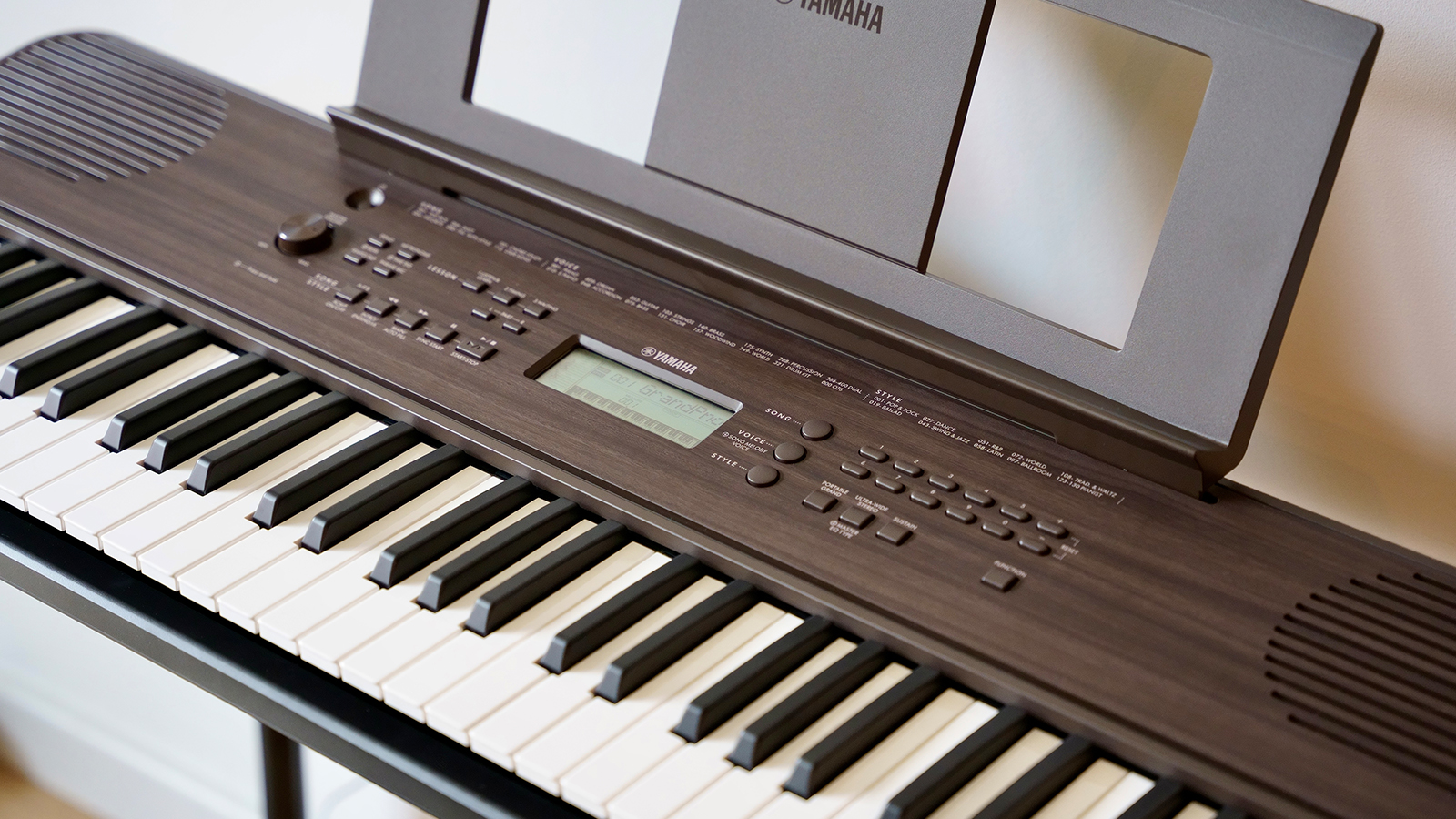
4. Yamaha PSR-E360
Our expert review:
Specifications
Reasons to buy
Reasons to avoid
✅ Buy if you are purchasing for a child: This is a fun and engaging keyboard ideal for younger players new to the instrument.
❌ Avoid if you are an adult: This keyboard is very much aimed at younger learners. For adults, I’d recommend the Yamaha NP-15.
What is it? Available in two stunning wood-effect finishes, dark walnut or maple, the PSR-E360 stands out as one of Yamaha's more stylish keyboards. But there’s plenty of substance behind that attractive exterior, boasting 384 voices, 130 auto-accompaniment styles, and a robust 112-track Song Book.
The keyboard features a nine-step Yamaha Education Suite lesson function, an intuitive recording capability (though it's limited to 300 notes per track), and an auxiliary input for connecting an external audio source. Plus, you can enjoy making music with a friend, thanks to a duo mode that divides the keyboard into two halves, each with its own middle C.
Build: Yamaha has earned its stellar reputation for designing thoughtfully constructed and durable instruments, and the PSR-E360 is no exception. Even at a budget-friendly price, it doesn’t compromise on quality or feel. This keyboard is impressively sturdy and can withstand the rigours of enthusiastic play from even the most boisterous child.
Performance: Simplicity reigns supreme with the PSR-E360. Tailored for young learners, it offers an intuitive interface that makes navigation and engagement a breeze. From activating auto accompaniment to switching voices, everything is designed to be hassle-free and enjoyable.
Yamaha has equipped this model with touch-sensitive keys, ensuring that every nuance of your performance is captured. As they describe it, "the touch-sensitive keyboard will accurately reflect every nuance of your playing, making your performances musically expressive." I wholeheartedly agree. Striking the keys firmly produces a bold tone, while gentle touches yield a softer, subtler sound.
Sound: In terms of sound, the PSR-E360 features an impressive array of 384 unique voices, along with 16 drum kits and various sound effects. With such a wide range of tones, it's natural that not every sound will be a standout. Yamaha excels in producing rich piano, electric piano, and string sounds, but as you explore the lower depths of the preset list, you might encounter some rather quirky and unconventional tones.
That said, this diversity does add an element of fun. Kids will likely delight in exploring the seemingly infinite array of tones and discovering the unique sounds they can create along the way.
Watch our demo video...

"The PSR-E360 makes a great first keyboard with its clean design and portability, though it lacks some modern connectivity. Newer PSR-E models like the E383 and E473 provide more advanced features for a similar or better value."
Read our full Yamaha PSR-E360 review
Best upgrade
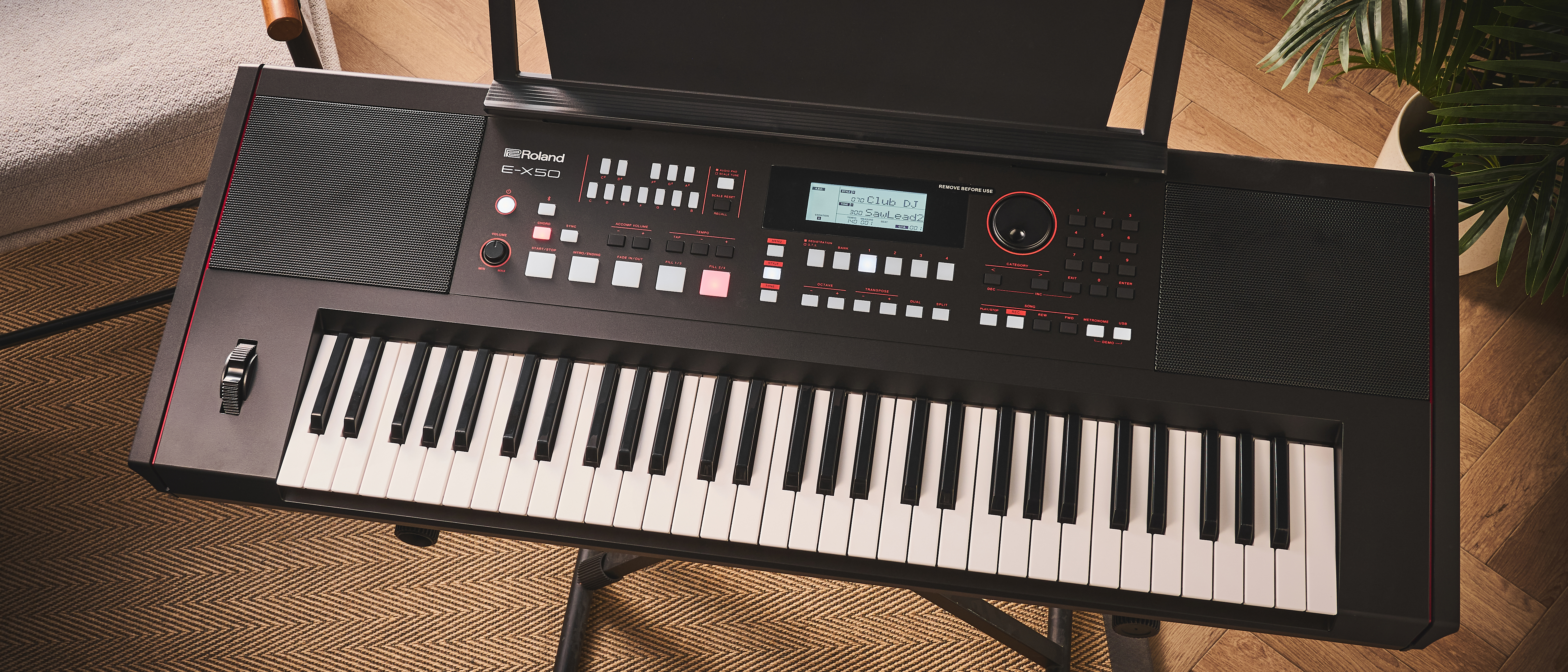
5. Roland E-X50
Our expert review:
Specifications
Reasons to buy
Reasons to avoid
✅ Buy if you are looking to upgrade: This is a powerful keyboard that’s loaded with Roland’s legendary sounds, auto-accompaniment, full-range stereo speakers and Bluetooth, making it the perfect second keyboard for established players.
❌Avoid if you don’t need too many features: There’s a lot going on with this keyboard. If you are seeking simplicity, I’d stick with the Casio Casiotone CT-S1 or Yamaha NP-15.
What is it? If you’ve outgrown your first beginner keyboard and are looking for something with a bit more flair, let me introduce you to the Roland E-X50. This isn’t just a basic entry-level keyboard; it's a fun and creative arranger packed with extra features.
Build: Despite its price, I found the Roland E-X50 to be very well constructed, with a sturdy build that can withstand even the most enthusiastic young players. It also includes some great extras, such as a built-in mic input with effects, perfect for those spontaneous karaoke sessions when you can’t resist belting out your favourite tunes. Additionally, it offers Bluetooth audio streaming so you can easily jam along to tracks straight from your smartphone.
Performance: The standout feature of this Roland unit is its sophisticated auto-accompaniment function, which allows you to generate full backing tracks that follow your lead and accompany your left-hand notes.
With a generous 300 preset styles ranging from rock, pop, and jazz to ballads, dance music, and traditional styles from various countries, we found this feature very easy to implement. I can't see any beginner, regardless of age, having difficulty diving into auto-accompaniment for the first time.
Sound: The E-X50 boasts an array of professional Roland sounds that will make you feel like a concert star in your living room. With a whopping 700 tones available, most of them are highly usable. While you might not frequently use a collection of bells or pan flutes, there are plenty of other sounds worth exploring, such as lush acoustic pianos, vibrant full-band sounds, and exciting synth tones.

"The Roland E-X50 is a good choice for beginners, offering creative features, strong connectivity, and a sturdy build. However, the keys feel a little stiff, and some sounds seem outdated for the price."
Read our full Roland E-X50 review
Best with weighted keys
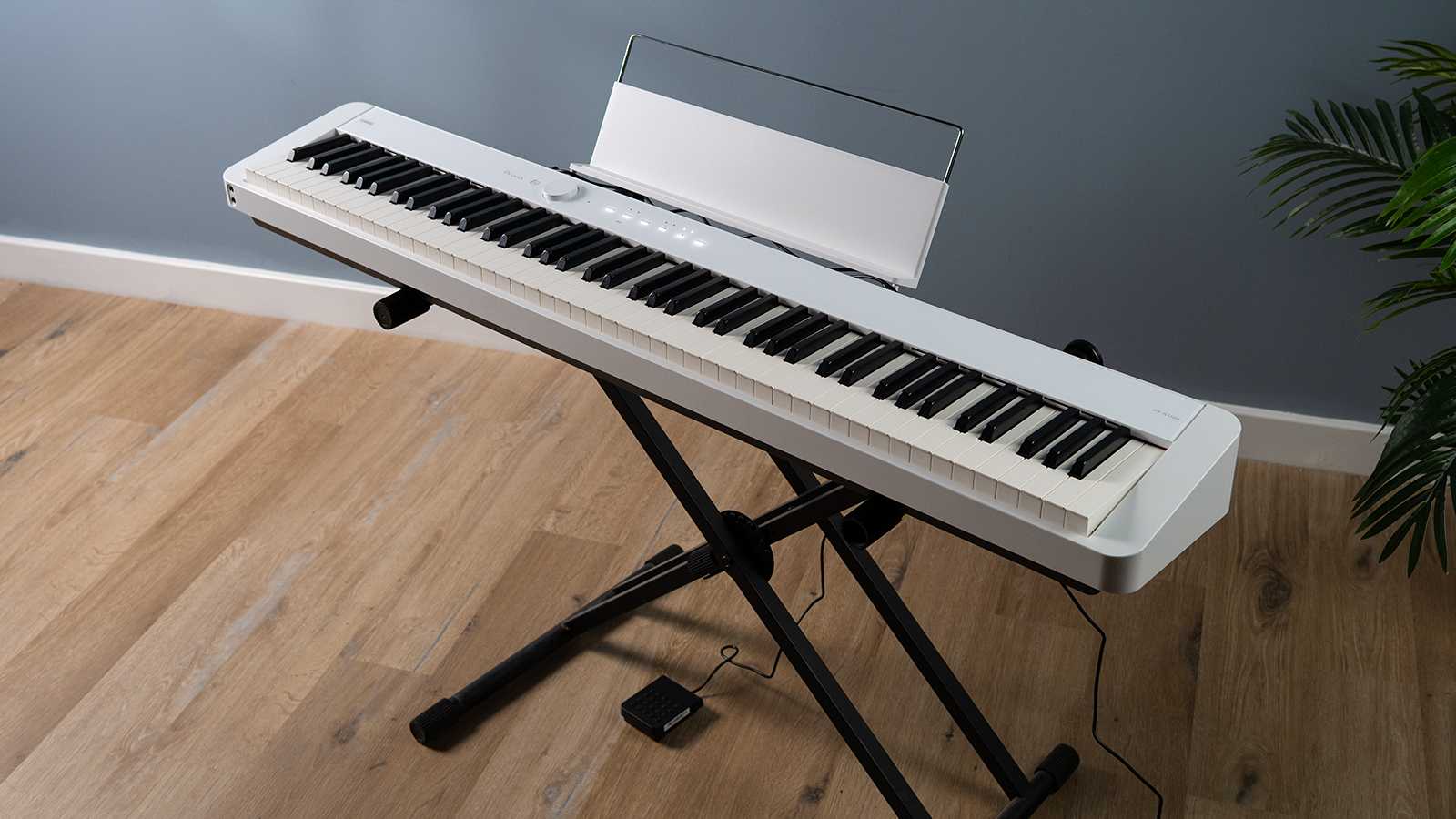
6. Casio Privia PX-S1100
Our expert review:
Specifications
Reasons to buy
Reasons to avoid
✅ Buy if you are looking for weighted keys: This Casio has a fantastic feeling key action.
❌Avoid if you aren't looking for weighted keys: Weighted keys aren't for everyone - especially very small children.
What is it? If you've got your heart set on learning the piano, then Casio's Privia PX-S1100 is the instrument for you. This model is our pick for the best beginner keyboard with weighted keys. This versatile and highly playable instrument walks the line between a piano and a keyboard, combining 88 full-sized keys and Casio's Scaled Hammer Action II with an impressive 18 voices – all in a lightweight, portable package.
Build: As this is technically a piano, it feels way more substantial than the rest of the keyboards on this list. The one word I’d use to describe the appearance of the S1100 is sleek. The glossy finish and subtle display result in a rather handsome-looking piano that is modern and contemporary. The inclusion of red felt at the bed of the keys is a nice extra touch that makes this entry-level piano feel more premium, and it's this level of attention to detail that we really enjoy.
Performance: As mentioned earlier, this contemporary beginner digital piano uses the Scaled Hammer Action II keybed. Casio is known for a light, beginner-friendly action, and the PX range is no different. This piano feels fairly responsive and, for the most part, is comfortable to play. The softer nature of the action will most definitely appeal to the aspiring pianist or those who find heavier keys difficult to navigate. That said, more experienced players may find the action a little subpar and may want to seek out a piano with a more authentic feel.
Sound: The Casio PX-S1100 shows significant improvement over its predecessor, primarily due to its newly designed 8W speaker system, which delivers clear and punchy sound without distortion. The bass response is impressive for its compact size, resulting in a richer overall tone compared to the previous model. For me, the redesigned main grand piano voice is the most impressive improvement, offering a responsive and dynamic playing experience both from the speakers and with headphones. While other sounds like E. Piano, Organ, and Strings are standard, they are sufficient for various performance settings, making the PX-S1100 a solid choice for those wanting to cover a lot of classic tones.
Watch our demo...

"The Casio PX-S1100 builds on the previous model and brings it into the modern day with smart features including Bluetooth audio and MIDI, as well as a fantastic new speaker system that delivers stellar sound at an accessible price point."
Read more: Casio PX-S1100 review
Spec comparison
Take a look at how our top choices compare, side-by-side.
Model | Price | Keys | Sounds |
|---|---|---|---|
Casio Casiotone CT-S1 | $219/£215 | 61 | 61 |
Casio CT-S300 | $179/£189 | 61 | 400 |
Yamaha PSR-E360 | $199/£129 | 61 | 384 |
Yamaha Piaggero NP-15 | $239/£209 | 61 | 15 |
Roland E-X50 | $599/£298 | 61 | 433 |
Casio PX-S1100 | $729/£454 | 88 | 18 |
Glossary of terms
If you are new to keyboards, then you may be confused by the wealth of terms and technical jargon used when describing these instruments. That’s totally understandable. Here is a list of key terms that should make reading about beginner keyboards a little easier.
Action: The mechanism inside the keyboard that controls how the keys respond when played, affecting feel and performance.
Bluetooth: A wireless technology that allows the keyboard to connect to devices such as computers, tablets, or smartphones for data transfer or audio playback.
Double-braced stand: A type of keyboard stand designed for greater stability and support, featuring two braces for added strength. Ideal for models with weighted keys.
Keys: The individual levers on the keyboard that, when pressed, produce musical notes.
Keybed: The base structure of the keyboard that houses the keys and action mechanism.
MIDI (Musical Instrument Digital Interface): A standard for connecting electronic musical instruments and controlling various aspects of sound production.
Pedals: Foot-operated controls that can modify the sound produced by the keyboard, such as sustaining notes.
Polyphony: The number of notes that can be played simultaneously on a keyboard, important for complex chords and musical textures.
Single-Braced Stand: A type of keyboard stand that is lightweight and portable, featuring a single brace for support, suitable for smaller keyboards.
Sound Engine: The internal system responsible for generating sounds in a digital keyboard, determining the quality and variety of sounds produced.
Transpose: The feature that allows players to shift the pitch of the keyboard up or down by a set interval.
Touch Sensitivity: The keyboard's ability to respond to the pressure and speed of key presses, affecting volume and tone.
Weighting: The degree of resistance to the press of the keys, which can simulate the feel of an acoustic piano.
How to choose
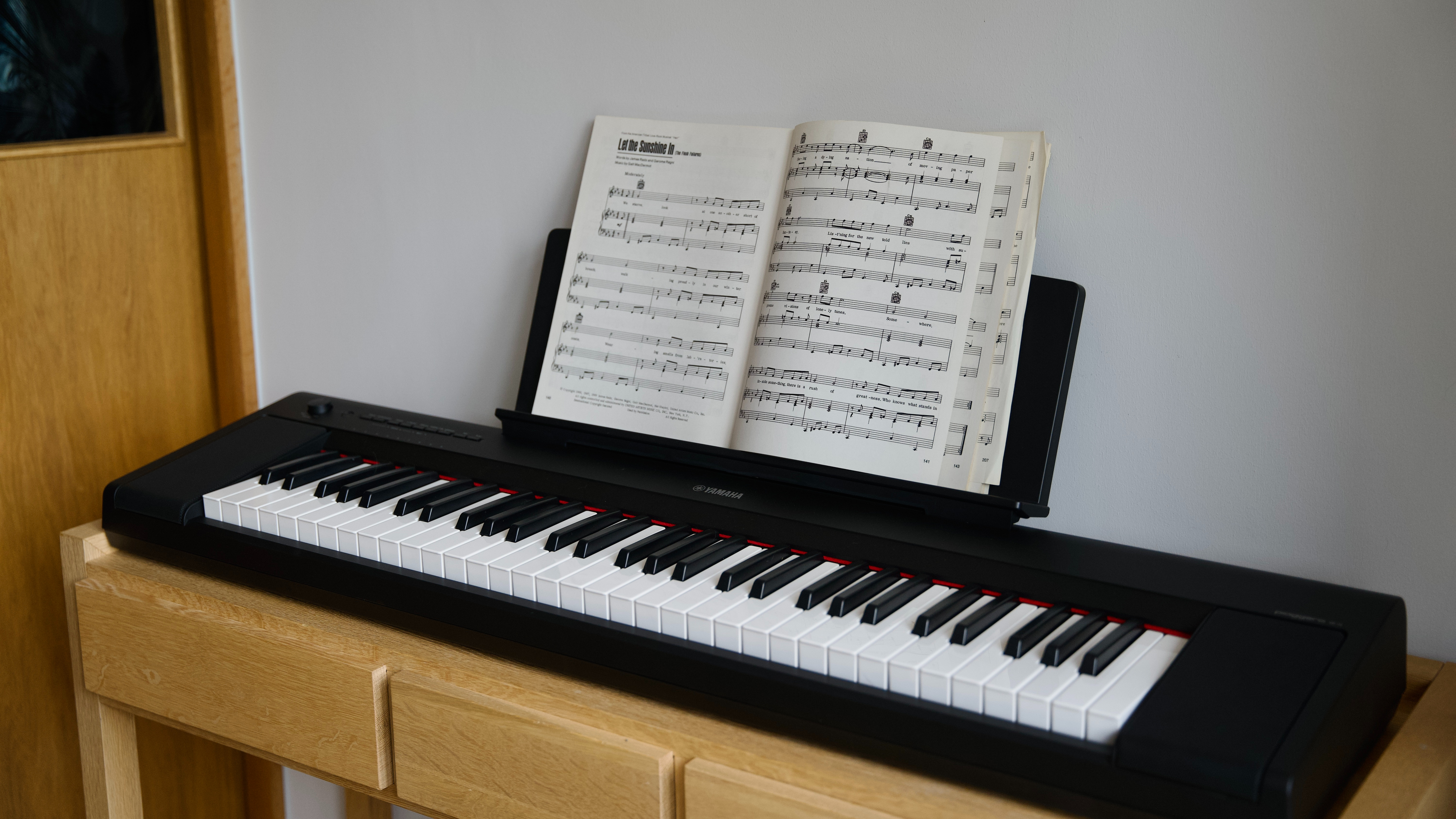
Okay, so you are in the market for a beginner keyboard, but the instrument you choose will depend on your specific needs as a player. When buying a beginner keyboard, it's important to consider the following factors before making a purchase.
Number of keys: The most common configurations are 61, 76, or 88 keys. If you’re just starting, a 61-key model might be ideal, as it’s more portable and sufficient for most child beginners. If you plan to play more classical or full piano pieces, consider an 88-key keyboard so you have access to the complete range of notes.
Action: Keyboards come with different action types, such as weighted, semi-weighted, or synth action. Weighted keys simulate the feel of an acoustic piano, making them ideal for developing proper finger strength and technique. Semi-weighted keys offer a middle ground, while synth action keys are often lighter and more suitable for electronic music.
Touch sensitivity: A touch-sensitive keyboard responds to how hard or soft you play, allowing for greater expression in your performance. This feature is crucial for practicing dynamics and developing your feel.
Sounds: The quality of sounds, instruments, and effects is vital. Look for keyboards that feature a range of bank sounds and effects, so you can experiment and have fun.
Connectivity: Consider models that offer USB, MIDI, or Bluetooth connectivity. These options will allow you to connect to computers or apps for additional learning materials, recordings, or music production.
Portability: If you'll be carrying your keyboard to lessons, opt for a lightweight and compact model. However, ensure it’s not so small that it limits your playing experience.
Budget: Set a budget before you start shopping. While it's tempting to choose the cheapest option, it’s often worth investing a bit more to get a model that will support your learning journey.
FAQs
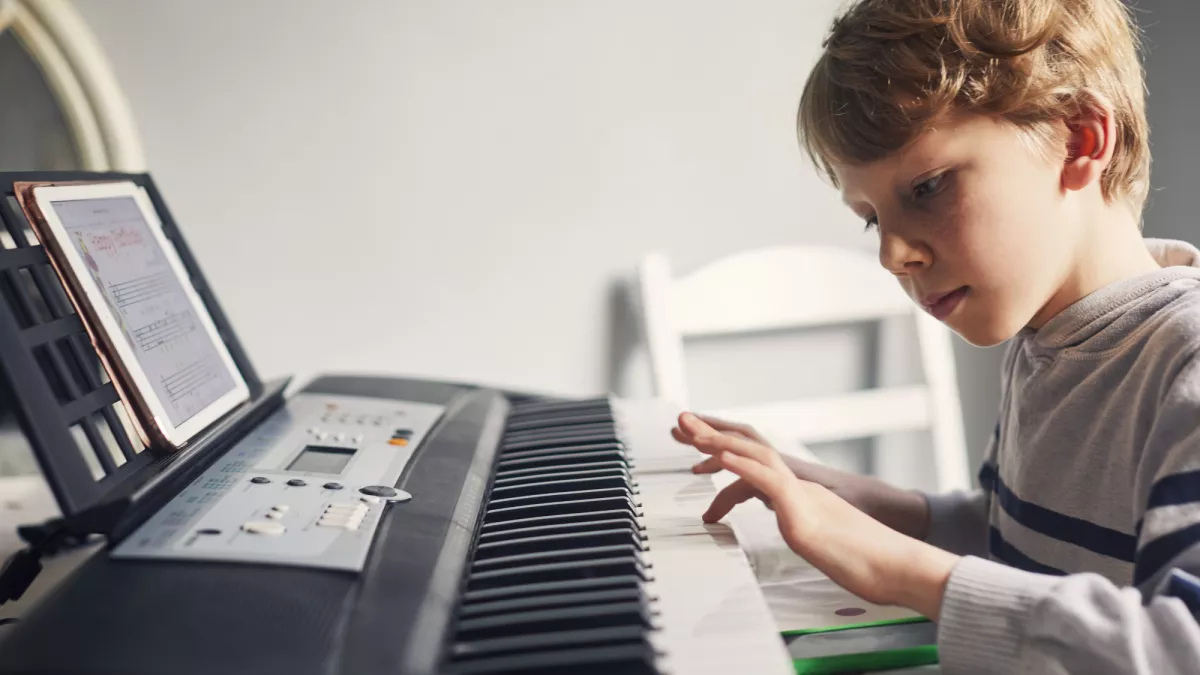
What is the difference between a keyboard and a digital piano?
So what is the difference between a keyboard and a beginner digital piano? Dedicated digital pianos are aimed more at people who want an alternative to an acoustic piano, with full 88 weighted keys. Keyboards, on the other hand, are generally loaded with extra features and sounds. Keyboards are also more portable, with some having the option to be battery powered.
Some sort of acoustic piano sound is nearly always top of the list of sounds that a keyboard for beginners comes with. Still, the quality of this sound will be an important consideration – generally, the cheaper the keyboard, the less realistic the piano sound is likely to be.
Keyboards will usually have some sort of rhythmical accompaniment section with preset drum rhythms built-in, and many even feature onboard tuition features such as illuminated keys, a metronome and built-in songs to play along with.
How many keys do you need?
Keyboards come in numerous sizes, with the standard being 88 keys. Smaller keyboards are available with 76, 61, 49 and even 25 key options out there. When starting out, it's best to go for something that can accommodate two-handed playing straight away, or you'll be wanting to upgrade sooner than you think. For this, you'll need at least 49 keys or four octaves.
For this reason, we've made sure all of beginner keyboards in this guide have a minimum of 49 keys, except for one – the Yamaha PSS-A50, which has 37 mini keys making it suitable for small children or players with small hands.
As a general rule - bigger is always better. Go for as many keys as you have room for, or your budget will allow. Buying a full-sized keyboard piano at the beginning means your new instrument has room to grow with you as you progress on your keyboard-playing adventure.
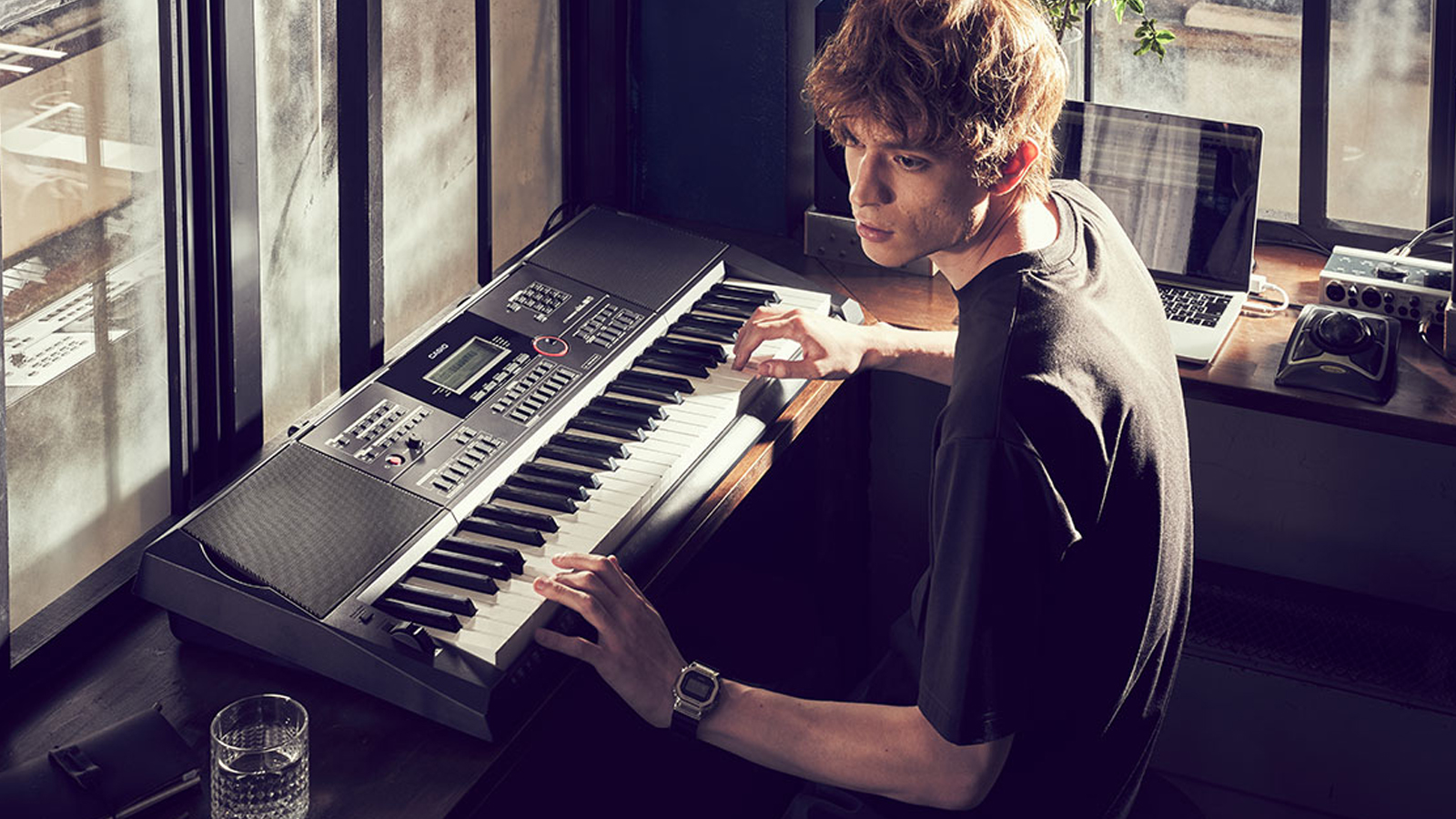
What is the action of a keyboard?
The action describes how easy or hard the keys are to actually press down to produce a note. Real pianos have weighted keys and, therefore, quite a heavy action, so for beginners, a more lightly-sprung ‘synth action’ keyboard is more likely to fit the bill to start with.
A light action is often better for small hands in particular, but don’t be too tempted by mini-size keys – little hands can quite easily handle full-size keys as long as the action isn’t too heavy, and learning on full-size keys will remove the need for switching from mini to full-size at a later point, which can be difficult once you’ve got used to small keys.
Does a keyboard need lots of sounds?
The number of sounds that your piano keyboard for beginners should have comes down to what you want to use it for – you don’t necessarily need hundreds of sounds if your main interest is simply learning piano. There are plenty of options out there that offer little more than 10 high quality sounds.
That said, if you’re buying a keyboard for kids to learn to play their favourite songs on, a wide variety of tones is arguably more likely to keep them interested in the long term, plus it will make the keyboard more entertaining for when they’re playing it outside of lesson time.
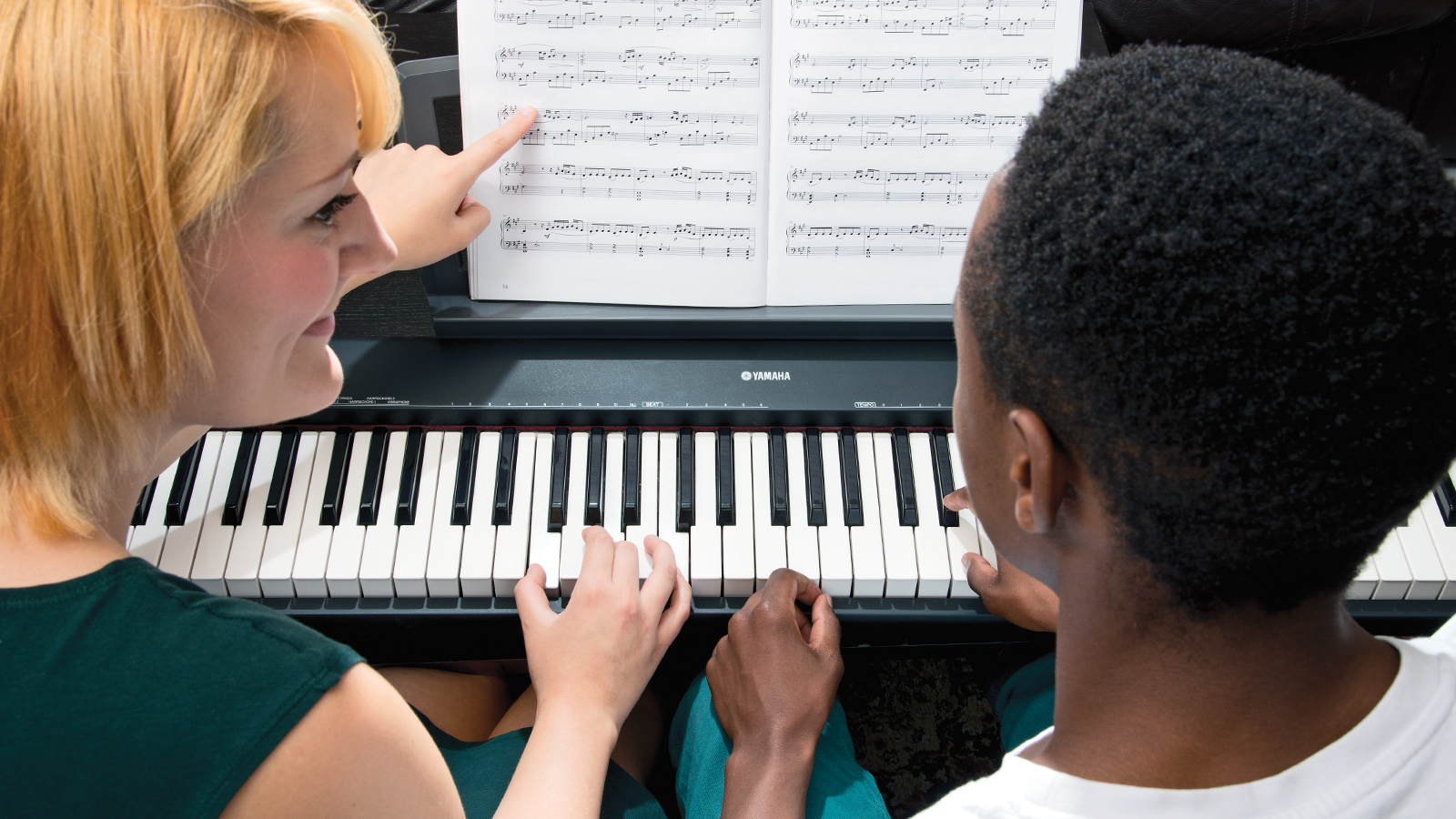
What is a velocity sensitive keyboard?
Velocity-sensitive keyboards respond to how hard you hit the keys while playing, emulating the response of an acoustic piano - the harder you hit a key, the louder the note that comes out.
It’s important to learn how hard to press the keys from the off if you’re seriously considering making any kind of progress as a player, so velocity sensitivity is an important item on your wishlist.
It will also give you more accurate feedback for monitoring the development of finger strength and independence when practising.
How many sounds does my beginner keyboard need to have?
When you’re starting out, your first keyboard piano probably isn’t going to sound as good as the ones the professionals use – after all, you wouldn’t shell out hundreds on a top-end keyboard if you’re not 100 percent sure that you or your budding pianist are going to persevere beyond Frere Jacques. Because of this, keyboards for beginners and kids can often skimp on sound quality, promising hundreds of tones that are all really just endless variations of one or two basic sounds.
Our advice would be to go for keyboards with fewer, better quality tones. This will help you to achieve a better sound right from the start, inspiring the confidence to help you progress with your lessons. In our opinion, if it actually sounds like you’re playing a piano while you’re learning, you’re much more likely to stick with it!
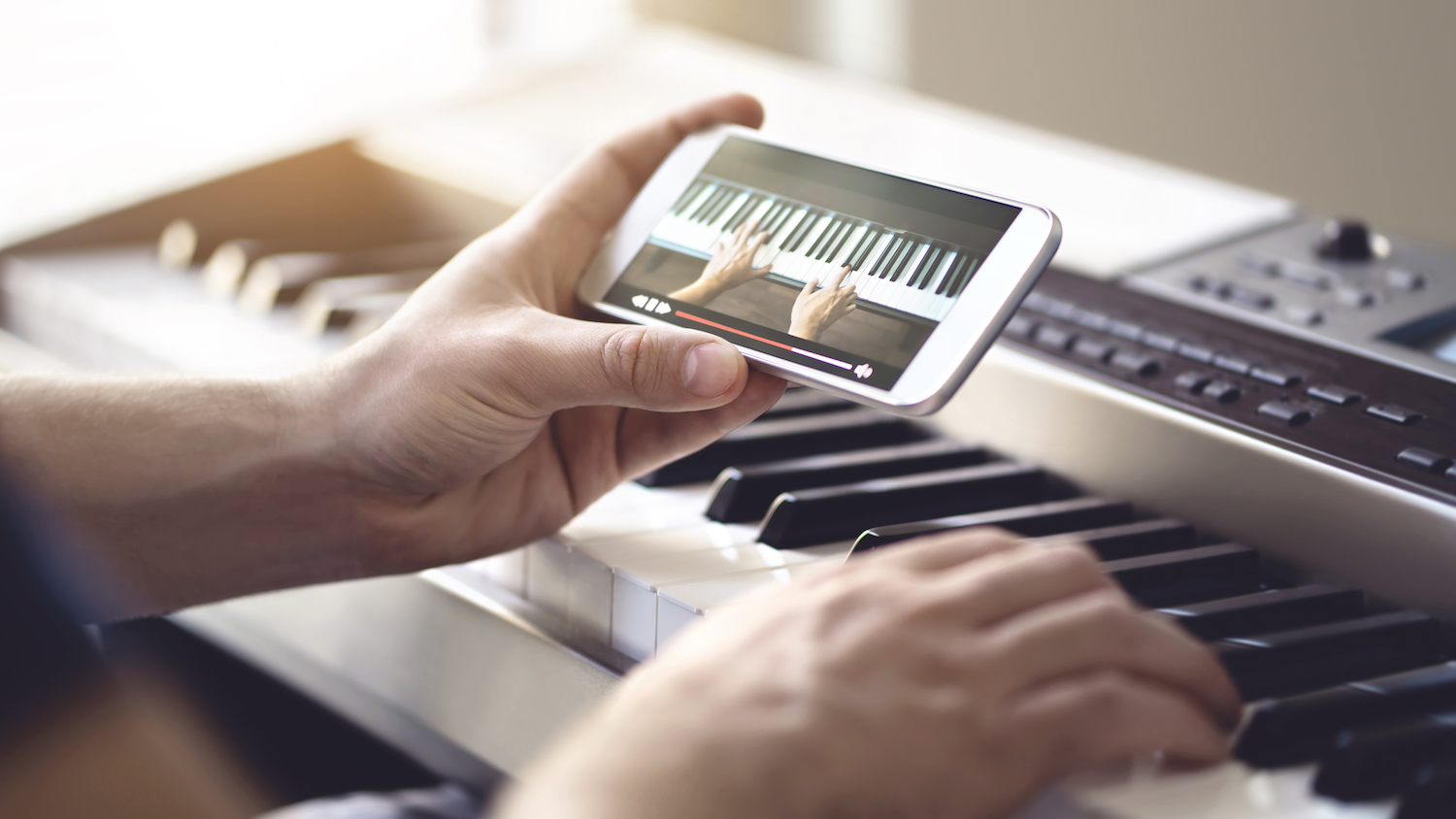
What's the best way for a beginner to learn the keyboard?
Traditionally, if you wanted to learn the keyboard, your first port of call would be a stack of sheet music, books and one to one lessons. Now, this is still a valuable way to start your musical journey, but with giant leaps forward in technology, there are certainly more convenient ways to learn.
There are a wealth of piano learning apps out there that can show you everything from how to sit at your instrument, how to play scales and chords and even how to master your favourite songs. Most of these apps will charge a monthly subscription fee to access a full course of lessons, with nearly all offering a free trial of some description. To find out more, check out our in-depth guide to the best online piano lessons.
What's the best age for a beginner to start learning the keyboard?
Really, there is no optimal age for learning the keyboard - if your child shows an interest in learning, it's worth giving it ago. That said, there are a few things to consider.
Very young players can have problems with overly large keyboards, so it's worth sticking to 49 or 61 keys and progressing to the full 88 notes when you feel they are ready. Similarly, children can find it challenging to navigate fully-weighted piano keys, so they should start on semi-weighted or synth-like keys. Older beginners won't have this issue, so they can learn with any keybed.
What accessories do I need for my beginner keyboard?
So, once you've decided on the best keyboard for beginners that suits your needs, the next step is to kit yourself out with all the essential piano accessories that will make your learning experience a lot easier.
Keyboard stand: One of the first and most crucial accessories to grab is a sturdy keyboard stand. Make sure the stand you go for is appropriate for the size and weight of the keyboard you have. For non-weighted keyboards, you will most likely get away with a single braced stand, but for instruments with weighted keys, you are better with a double-braced stand for added security.
Bench: A solid and high-quality piano bench will not only ensure you are comfortable while sitting for hours and hours practising, but it will also ensure you play in the correct position, with the optimal posture.
Now, benches come in various styles, and which you choose is dependant on your specific needs. The most popular types are adjustable benches, which allow you to set a particular height to ensure the player is comfortable and storage benches with a hidden compartment for housing your books and learning materials.
Headphones: A good set of studio headphones will go a long way to helping with your practice. Not only will you be able to practice in relative silence, but you'll also get to hear your new keyboard piano in all its glory.
Sustain pedal: While some keyboards come with a sustain pedal, they aren't always the best. We highly recommend upgrading to a piano style pedal. If your keyboard didn't have a pedal included, then it's worth investing in one - you can't play modern pop songs without it.
Music Stand: Got lots of books and sheet music? Well, it's worth picking up a good quality music stand to keep all your pages in order.
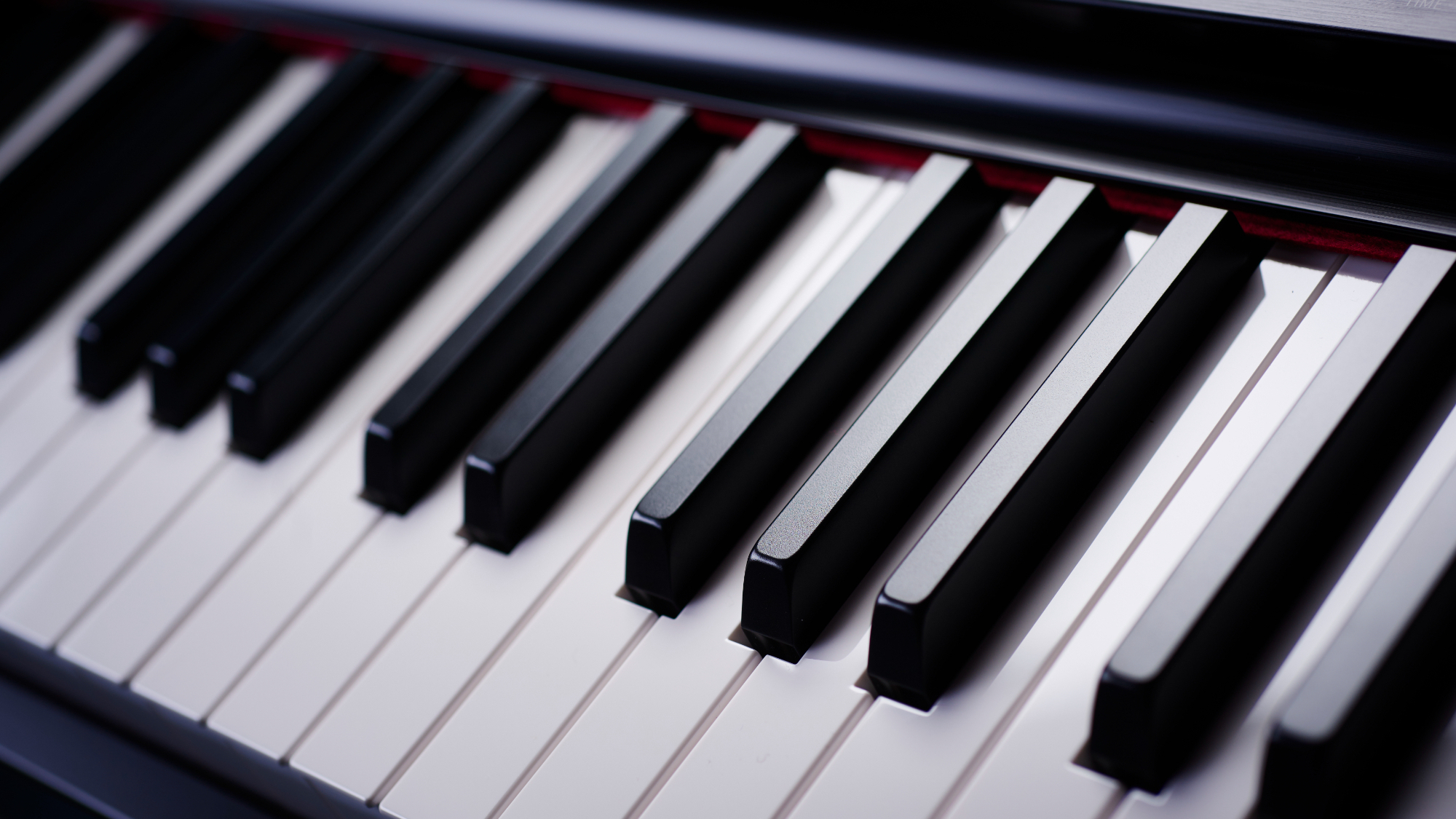
Which brands make the best keyboards for beginners?
You can't go wrong with the big guns, such as Yamaha, Casio, Roland and Korg. These brands not only make some of the best keyboards for beginners in the world, but they also produce professional products that the biggest names in music use on tour and in the studio. So if in doubt, go with one of the big four, and you're sure to get a great keyboard that will last.
How much should I spend on a beginner keyboard?
When working out how much to spend on your new keyboard, you must first think about what you want to get out of your new instrument. If you are simply looking for an inexpensive way to tinker around with some chords, learn scales or see if it is the right instrument for you, then you don't need to spend a fortune. You can easily pick up a well-made keyboard for around $/£150 - $/£200.
For many, the humble keyboard is merely a stepping stone to learning the piano. Now, while it may be tempting to go for a basic option, you may want to consider looking for a keyboard with full-sized keys to ensure you don't pick up any bad habits that may hinder your progress on the piano. Of course, this will cost you a little more, but it will be worth it in the end.
If you're looking for a keyboard that will grow with you, then you'll want to look for something around the $/£300 - $/£500 mark. This will ensure you don't need to upgrade your keyboard unnecessarily, ultimately saving you money in the long run - providing you stick at it.
Should I use user reviews, forums and influencers to help me find the right beginner keyboard for me?
When researching a new keyboard, it's essential to consider a variety of sources for information. While user reviews and forums can provide valuable real-life insights into how a specific keyboard performs at home, it's essential to remember that nothing can compete with decades of professional testing and unbiased opinions.
Professional reviews often provide a comprehensive analysis of performance, build quality, feature set, and how the instrument compares to others on the market. These reviews delve into important factors that may not be as evident from user reviews alone, ensuring a thorough evaluation of the product.
So, with that in mind, we think adopting a well-rounded approach that takes into account both user experiences and expert evaluations can empower you to make a more informed purchasing decision tailored to your specific needs and preferences.
Why you can trust us

✔️More than 9,500 reviews on-site
✔️Over 17 years of product testing
✔️ 2.9 million monthly users globally
With more than 17 years of experience, MusicRadar is the premier music-making website in the world. Run by musicians for musicians, we offer expertly written gear round-ups and high-quality, authoritative reviews by an extensive team of highly experienced industry professionals.
We also interview world-renowned musicians and stars about their creative processes and the nuts and bolts of their gear and technique. This gives fans an insight into the actual craft of music-making that no other music website can.
But that's not all. We also provide excellent tuition, from bite-sized tips to advanced techniques and guidance from recognised musicians.
As well as delivering high quality written reviews and features, we also produce a wealth of video content on YouTube. MusicRadarTV is where you'll find all of our access-all-areas interviews, hot gear demos and exclusive video lessons.
Below you'll find more information on the authors of this guide.
Meet the experts

Daryl is a Senior Deals Writer at MusicRadar and is responsible for writing and maintaining buyer's guides on the site as well as testing out products for reviews. Before writing for MusicRadar, Daryl worked for many years in music retail, helping musicians of all ages find the best gear for them. Whether it was a beginner's first keyboard or a top-of-the-range digital piano for the pros, Daryl was there to help steer players in the right direction.

Dave is an expert in all things keys, from beginner keyboards, to digital pianos, synths and beyond, and has been a music technology writer and product tester since 2007, contributing to the likes of Computer Music, iCreate, MusicRadar and Attack Magazine. Dave has also programmed and played keys on recordings by a range of world-renowned artists including George Michael, Kylie and Gary Barlow.
How we test the best keyboards for beginners
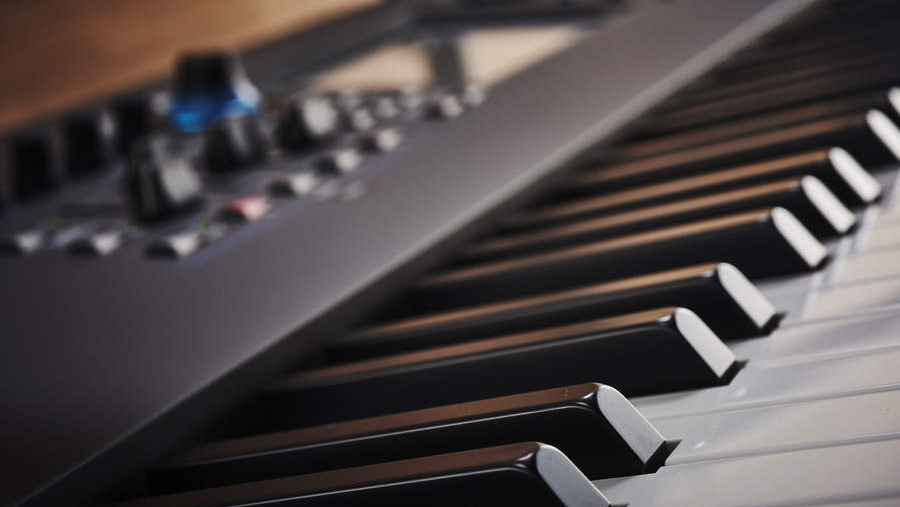
It's fair to say we aren't short of choice when it comes to keyboards suitable for beginners. There are literally hundreds on the market. For that reason, it's essential that we test the instruments to ensure they are worthy of inclusion in this guide to the best keyboards for beginners.
When we receive a keyboard for review, we start by asking ourselves the following questions:
- How easy is the keyboard to play for a complete beginner?
- Are the sounds inspiring and varied?
- Is the unit easy to navigate without reaching for the manual?
- Is the keyboard well-made and robust?
- And does the keyboard offer the user good value for money?
This enables us to produce accurate, well-balanced and real-life reviews to help you easily figure out whether the plugs you’re interested in are really the best choice for you.
Our testing criteria in detail:
Payability: The first test - and most vital for us - is how the keyboard feels under our fingers. This is, of course, a combination of the key action as well as the size and shape of the physical key. To test the key action, we'll make sure to play varying dynamics to see how the instrument responds. We'll be sure to try out a myriad of different musical styles while we're at it. This goes hand in hand with the keys' texture, shape, and size. As these instruments are aimed squarely at novice players, they should feel welcoming and not too rigid.
Sound: Next is the keyboard's sound. We will carefully review the list of inbuilt tones, paying close attention to the speakers' frequency range and assessing the usability of the voices. We aren't all that interested in a keyboard with a million sounds if only two or three are actually usable.
Features: Next, we will review any extras included with the keyboard, such as pedals, audio outputs, MIDI compatibility, and any accompanying app. Here, we are looking to see what else the keyboard offers.
Build quality: Of course, we need to examine the keyboard's overall build quality. It's crucial for the instrument to exude a sense of robustness and solid construction. While it's understandable that keyboards in this price range may be crafted from relatively inexpensive plastic, it's imperative that they don't feel fragile or poorly constructed.
Value: When evaluating a keyboard, the last part of the equation is value for money. It's not just about the features and performance but also about whether it's worth the price. We'll carefully combine our thoughts on all the above sections - from design and functionality to performance and sound - and weigh them against the keyboard's price to determine if we think it's worth the investment.
Read more about how we test beginner keyboards at MusicRadar.
Latest updates
10/09/25: This guide has been updated with an all-new list of products.
12/01/25: We've added a spec comparison table so you can easily compare each model side by side.
09/09/24: We've gone through the guide to ensure we are still recommending the best beginner keyboards on the market. We've also made small tweaks to the page navigation.
Related buyer's guides
MusicRadar's got your back
- Watch your lessons with the best iPads for musicians
- 8 great beginner piano songs to learn
Want all the hottest music and gear news, reviews, deals, features and more, direct to your inbox? Sign up here.

I'm a Senior Deals Writer at MusicRadar, and I'm responsible for writing and maintaining buyer's guides on the site. As part of my role, I also scour the internet for the best deals I can find on gear and get hands-on with the products for reviews. My gear reviews have been published in prominent publications, including Total Guitar, Guitarist, and Future Music, as well as Guitar World.com. I've also had the privilege of interviewing everyone from Slash to Yungblud, as well as members of Sum 41, Foo Fighters, The Offspring, and many more.
In a previous life, I worked in music retail, selling everything from digital pianos to electric guitars. I'm also a fully qualified sound engineer who holds a first-class Bachelor's degree in Creative Sound Production from the University of Abertay.